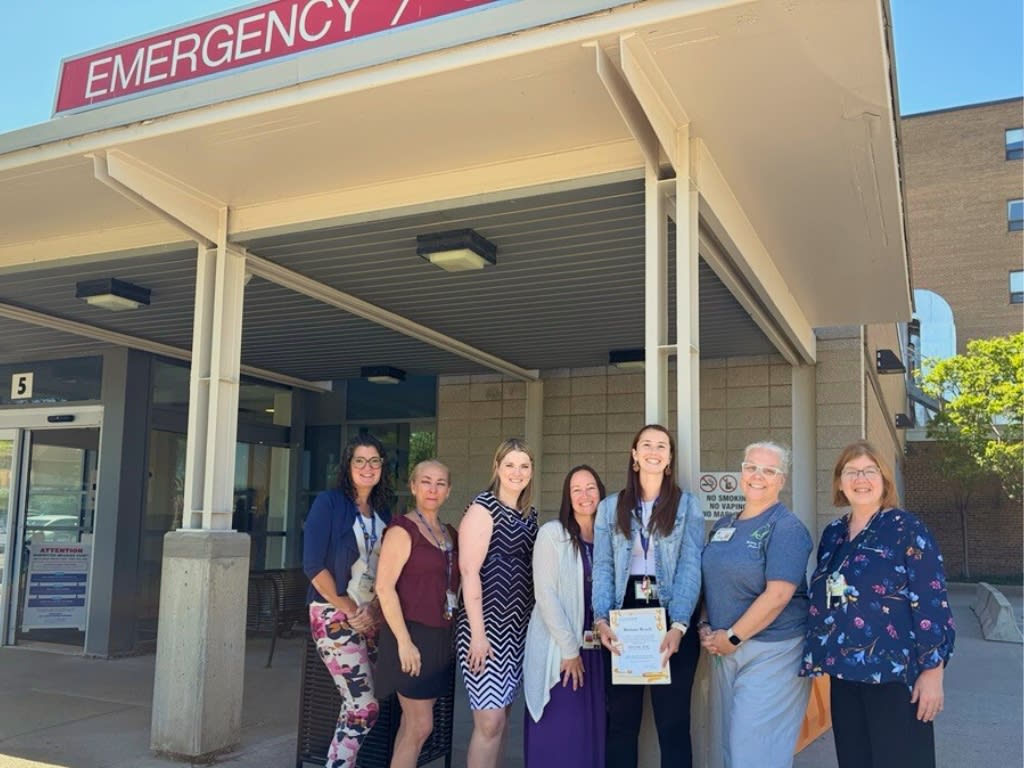
(From left): Shawna Speck, Clinical Manager, Welland Emergency Department; Le-Anne Ryan, Registered Nurse; Sarah Putman, Director of Education Services, Alzheimer Society of Niagara Region, Stefanie Irish, Clinical Manager, Geriatrics; Brittany Roach, Dementia Resource Consultant, Alzheimer Society of Niagara Region; Leah Puddester, Registered Charge Nurse and Laurie Angle, Nurse Practitioner, Geriatric Emergency Management.
When an older adult living with dementia arrives in the Emergency Department (ED) confused and agitated, it’s not always a medical emergency that brings them in.
Sometimes it’s exhaustion, stress or a caregiver who doesn’t know where else to turn.
That’s where Brittany Roach comes in.
Roach is a Dementia Resource Consultant with the Alzheimer Society of Niagara Region. She works as part of a growing partnership between the Society and Niagara Health — a key part of the hospital’s commitment to advancing care for older adults across the region.
The collaboration is grounded in the DREAM program — Dementia, Resources, Education, Advocacy and Mentorship — which launched in early 2024. Operated by the Alzheimer Society of Niagara Region, the DREAM program places trained consultants directly in EDs to help support older adults experiencing cognitive changes.
In just months, the program has reached more than 300 individuals, helping over 100 patients avoid unnecessary hospital admission through early intervention and connection to community services.
“We’re seeing more and more people coming in with cognitive changes — and more families looking for help,” says Laurie Angle, a nurse practitioner with Niagara Health’s Geriatric Emergency Management (GEM) team. “Older adult care is a priority for us. We know this population has unique needs and we’re building our systems around that.”
Cognitive changes such as memory loss, confusion, difficulty with communication or changes in behaviour or judgement are common among older adults living with dementia. In many cases, these conditions can be safety managed in the community with the right supports – avoiding the stress and risks associated with hospital admission.
“Hospital stays can increase the risk of delirium, loss of mobility, hospital-acquired infections and functional decline,” she says. “Our goal is to avoid unnecessary admissions by providing the right support, in the right place, at the right time.”
Working alongside Roach and other DREAM consultants, the GEM team helps identify individuals who may benefit from home care, respite services or other community supports, including the Alzheimer Society of Niagara Region.
“Having dementia resource consultants embedded in the ED is a game changer,” says Angle. “It allows us to intervene earlier, reduce unnecessary admissions and most importantly - meet people where they are with the right kind of care. It’s an extension of our team — and of Niagara Health’s commitment to person-centred care.”
Sometimes that care looks like a colouring book, a blanket or a familiar voice. Other times, it’s a referral to respite care, a call to a family counsellor or help setting up in-home support.
“Every person is different,” says Roach. “Families often say it makes a huge difference just knowing someone is there for their loved one.”
Lori MacCullouch, Niagara Health’s Director of Patient Care for Complex Care and Geriatrics, agrees. She says initiatives like the DREAM program are central to a long-term strategy that puts older adults at the centre of care planning.
“The Emergency Department is fast-paced, and it’s not ideal for frail older adults or those with dementia,” she says. “This partnership gives us extra support at the right time and helps reduce stress for both patients and caregivers.”
Part of that support also involves staff education. Dementia Resource Consultants help ED staff develop strategies to manage responsive behaviours with compassion and confidence.
“This is about building capacity,” MacCullouch said. “We want all staff to feel equipped to care for older adults in a respectful, informed way.”
The partnership also supports the Alzheimer Society’s First Link approach — connecting individuals and families to community resources as early as possible.
“Families often don’t know what’s available in the community,” says Teena Kindt, CEO of the Alzheimer Society of Niagara Region. “By meeting them in the ED, we can make sure they get connected to the right resources before a crisis escalates.”
For Roach, it’s about more than avoiding hospital admissions — it’s about restoring dignity and offering hope.
“I’ve helped families connect to in-home care, navigate programs and services in the community and find counselling when they've felt overwhelmed,” she said. “Sometimes all it takes is one conversation to change someone’s care path.”

